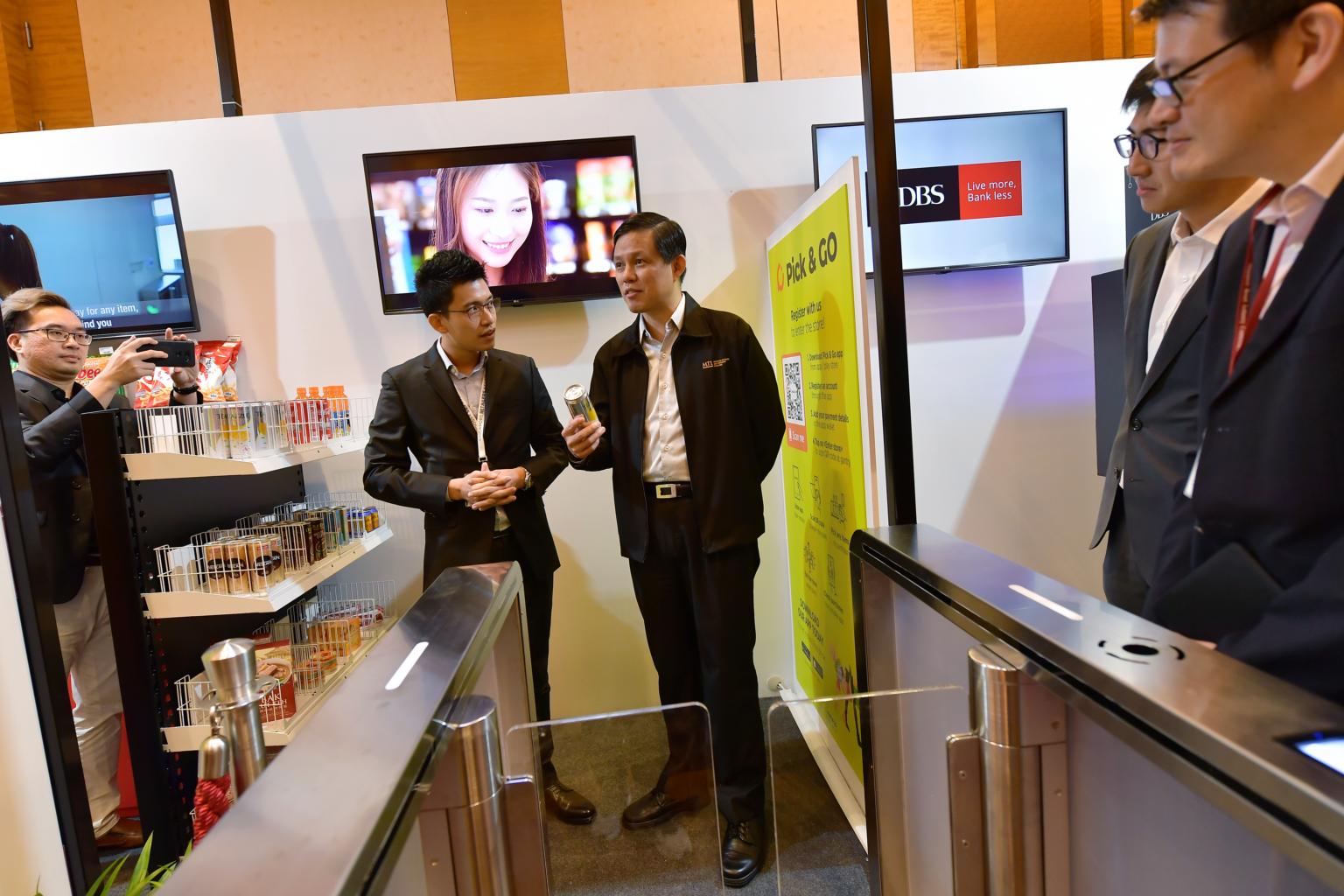Convenience stores going high-tech to stave off competition
S'pore brands to use artificial intelligence, palm scanners and RFID tags at unmanned kiosks
Sign up now: Get ST's newsletters delivered to your inbox

Director of Pick & Go Alex Ng (left), explaining how his unmanned booth works to Minister of Trade and Industry Chan Chun Sing.
ST PHOTO: NG SOR LUAN
The convenience store landscape is set to change, with retailers making greater use of cutting-edge technology to pilot unmanned kiosks.
Yesterday, three Singapore brands announced plans for new unmanned convenience store concepts that will debut this year.
They include using palm scanners to enter stores, radio-frequency identification (RFID) to track items taken off the shelves and artificial intelligence (AI) systems to track shoppers' movements.
The retailers showcased their concepts, which they developed with support from Enterprise Singapore, at the Singapore Retail Industry Conference and Exhibition 2019.
These innovations are part of ongoing efforts by the sector to hold its own against rising competition from online retailers and to cope with difficulties in hiring workers.
Trade and Industry Minister Chan Chun Sing, who spoke at the event, said he was encouraged by the ideas retailers had.
"They show the spirit of the sector, that even in difficult times, we are still constantly innovating and trying out new solutions," he said.
"That gives me confidence that this sector will be in good shape."
Unmanned stores have been around for several years, but there are only a few of them. NTUC FairPrice launched its first unmanned, cashless Cheers convenience store at Nanyang Polytechnic in 2017.
More recently, Singtel launched an unmanned pop-up store in June, which allowed customers to buy handsets, replace SIM cards and sign up for plans.
The newest entrants - Octobox, OMO Store and Pick & Go - hope the latest push will make a dent, and are piloting their new stores in university campuses.
Octobox opened its first 24/7 automated store at the National University of Singapore's (NUS) University Town earlier this month, and plans to open a second one on Jurong Island.
OMO Store, an initiative by Umart, a minimart chain with 51 stores islandwide, will open its first store at NUS' School of Computing next month, while a store by Pick & Go will open at the Singapore University of Technology and Design in October.
Pick & Go's director Alex Ng told The Straits Times that the store's AI system will be able to track mul-tiple customers even if they stand side by side and pick items from the same shelf.
"When a product is taken, the smart shelves will detect it. It will link up with the cameras and tag the item to the customer's account. Even if customers pick up an item and put it in their bag, the item will be charged to their account when they leave the store," he said.
At Octobox, customers who set up an account can scan their palms to not only enter the store, but also to make payment via their DBS PayLah wallet.
Event organiser Singapore Retailers Association also signed an agreement with NUS and the Singapore University of Social Sciences to work together to build up the retail industry through analytics projects and joint training to develop talent.
Mr Chan noted that times are tough for the retail sector, and might get tougher due to "downside risks and the many uncertainties around the world".
"So, we need to train our workers and adopt available technologies. If we can do these two things well, then we will have taken concrete actions to not only enable us to weather the current downturn, but also prepare ourselves and our workers for the next upturn," he said.
SEE TOP OF THE NEWS


